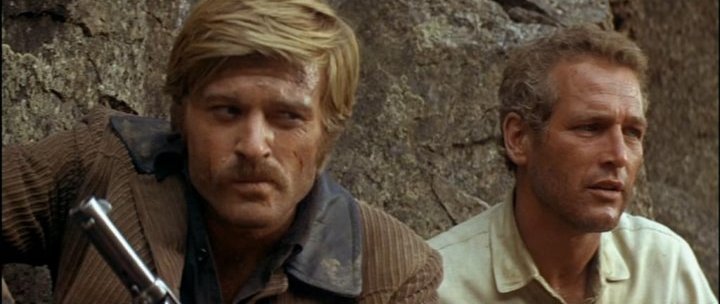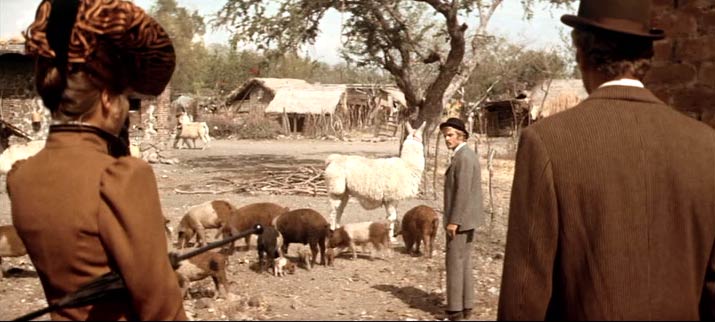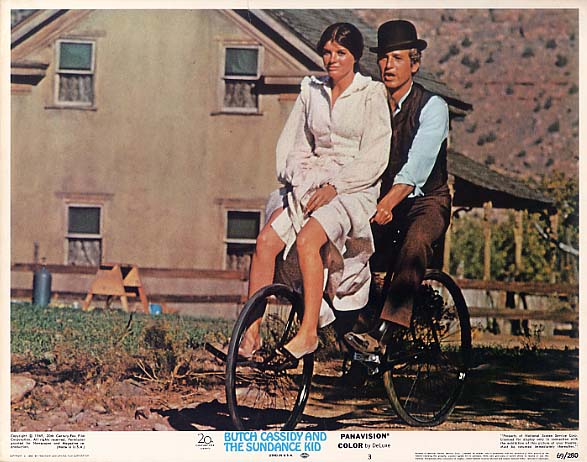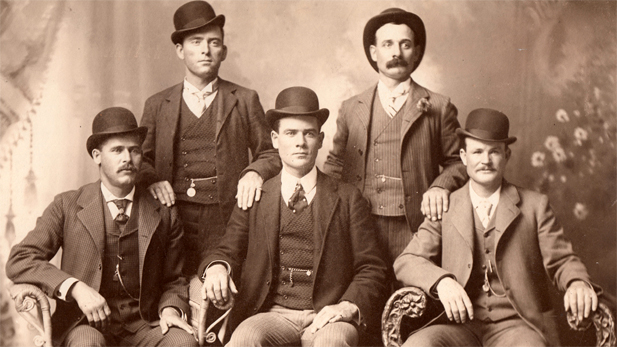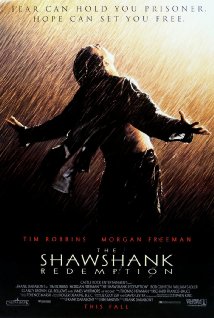
100 Movies … 100 Posts: #73. “Butch Cassidy and the Sundance Kid” (1969)
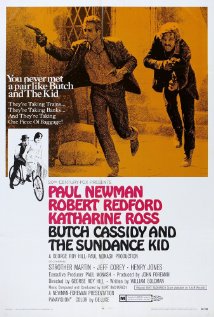 This is post #28 in my series, 100 Movies … 100 Posts. In this ongoing series, I’m watching and writing about each film on the American Film Institute’s list of 100 greatest movies from #100 to #1. I’m not just writing a review of each movie. I am going to write a piece about whatever I find most pressing, as a critique of the film, an address of the issues it brings up, or my own experiences with the film. It will serve as an examination of the list itself and of political issues in Hollywood and the film industry.
This is post #28 in my series, 100 Movies … 100 Posts. In this ongoing series, I’m watching and writing about each film on the American Film Institute’s list of 100 greatest movies from #100 to #1. I’m not just writing a review of each movie. I am going to write a piece about whatever I find most pressing, as a critique of the film, an address of the issues it brings up, or my own experiences with the film. It will serve as an examination of the list itself and of political issues in Hollywood and the film industry.
Without further ado, #73 “Butch Cassidy and the Sundance Kid”
——————————————-
The most popular genre in film is possibly the action-adventure. It’s easy to see why. The movies are usually pretty light, fun, very accessible, lots of action, can offer intellectual insights at times, and even if they don’t, they’re usually pretty entertaining. For the common movie goer, that type of film gives the most bang for their buck at the theater.
All of the best ones, or even all of the mediocre ones owe something to George Roy Hill’s 1969 film, “Butch Cassidy and the Sundance Kid.” Sure, there were adventure movies before this, and there were better ones to come since, but this film acts as a template for modern action films, sometimes to a fault. The winning formula was set in place in 1969, so Hollywood owes a lot to those bandits.
It has all the hallmarks of your typical action-adventure. Two buddies, who share some quiet intimate moments together in divulging each other’s names over drinks and hookers, attempting daring feats to get out of sticky situations, and surviving against all odds, pulling off flashy heists, some silly hijinks, odd character quirks, like the Kid needing to make some weird movements in order to be the sharpshooter he is, general clowning around, and pages of witty banter. Look at everything from “Fast and the Furious” to Marvel to Jackie Chan to “Terminator 2,” and in each of them you’ll find some element of “Butch.”
Paul Newman as the charismatic leader Butch and Robert Redford as the quiet but brash Kid make for an entertaining pair to watch, as they get themselves into and out of trouble with loads of panache and quips. Many of the action stars today are more notable for how they look without a shirt on, sometimes more than for their personality. But Newman and Redford have plenty of character to spare.
But the movie isn’t just action and jokes, it does have something intelligent to say. When Butch and Kid attempt one of their train heists, Butch and his hole-in-the-wall gang have the train stopped, and Butch threatens the man in charge inside the train that he’ll blow down the door if he doesn’t let them in. The guy inside the train refuses because he’s accountable for his boss’s money. Butch asks how could he work for a man who cares more about his money than his employee? The gang blows the door open, and Butch tells the guy his boss isn’t paying him enough. It underscores the corrupt nature of business, where workers are treated as expendable, and the only thing that matters is the company’s bottom line. And as Butch and Kid are bank robbers, it isn’t as if they’re any worse than the people they are stealing the money from. Train barons, as most business people, have hardly earned their fortunes without stepping on lots of little people along the way. A similar sentiment was a large part of last year’s excellent, indulgent “The Wolf of Wall Street,” where Leonardo DiCaprio’s Jordan Belfort painted himself as a Robin Hood of Wall Street, stealing from the rich, corrupt business men for his own benefit.
Unfortunately for Butch and Kid, on what they agree will be their last run, the train baron has a surprise waiting for them, which turns out to be a posse made of the most notorious, most costly lawmen in the country, out to put a stop to the thieving. As Butch says, the group probably cost more than Butch and Kid have stolen on all their jobs combined. The posse has no intention of bringing the criminals back alive. The middle third of the film has Butch and Kid on the run, leading them to seek help from a sheriff whom they have in their pocket. The sheriff foreshadows their eventual demise, saying that their thieving ways have caught up to them, and they won’t be getting out of this alive.
So, they flee, along with Kid’s girlfriend, Etta (Katherine Ross), to Bolivia, because Butch says there will be lots of opportunity for business there. Although when they get off the train, they are greeted by some llamas and a small, sleepy, dusty town, they eventually learn their way around. The first bank job they attempt goes awkwardly, as they don’t have their Spanish down yet, but eventually, they figure out what they’re doing, but it isn’t enough to sustain them. They attempt to go straight and get real jobs, but their first job as security goes poorly as they get their employer killed.
Even though Etta is “only” Kid’s girlfriend, she is at least given some agency, something which is less common now. When faced with the prospect of having to move to Bolivia, she tells Kid that she’ll do anything he asks, except for one thing: she won’t watch him die. So, she makes it clear that she loves her man, but is strong enough to warn him not to be foolish. When it’s clear that the boys aren’t making any headway in Bolivia, she tells him she’s had enough and she’s going home, which she does.
Unfortunately, there’s a creepy scene between Kid and Etta near the beginning of the movie, where the viewer is unaware of the relationship between the two. Kid sneaks into her house, and makes her undress at gunpoint, as if he’s forcing her to do it, which is a pretty uncomfortable scene. Eventually, she chides him for being late, and the audience is let in on the “joke,” that they’re actually together. But even though a couple might have such a relationship where that sort of thing is playful and friendly, under the assumption the movie expects the viewer to make with this appearing to be a rape scene, it’s almost playing rape as part of the entertainment. Maybe it was an attempt to make the character and the movie seem “edgy,” but it comes off as more exploitative. Once it’s made clear that the characters are romantically involved, it’s a relief, but even playing on that assumption is rather tasteless in an otherwise, highly enjoyable movie.
The film does also glorify white crime, which is a pretty common trope in American entertainment.Historically, the duo weren’t exactly the worst of criminals, mostly knocking off banks and trains. It’s not like they were serial killers or anything. But in comparison, black criminals in movies made around the same time as “Butch” were pretty much treated as the lowest of the low, like human trash basically, as seen in “The French Connection,” for instance (with the exception of the great “In the Heat of the Night”). In more modern films, black criminals are always thugs. Even when black criminals are the protagonists of the film, it’s always a black character making the wrong choice because of the allure of gangs. Whereas white crime, a la Walter White or Butch and Kid, is cool and exciting, in “Menace II Society” or “Do the Right Thing,” (both directed by black men), the perpetrators are viewed as menacing gangbangers.
A lot of that comes from the viewer’s perception of course, and Hollywood has been improving more recently. It’s important to critique the roots of modern cinema even decades later, especially since “Butch” obviously still has a strong influence on the movies people spend the most money on. And especially with recent ongoing issues with cops and their highly questionable at best killings of black people, along with the riots, it’s important to look at perceptions of people through the media, and where those perceptions could come from. It’s not like watching “Butch Cassidy and the Sundance Kid” will make someone a racist, but it does show a huge double standard, which can be seen throughout media, public opinion, and especially Hollywood. It’s far from the only movie on the AFI’s list that glorifies white crime. And the juxtaposition of crime and race is such a major issue right now that it needs to be explored from many angles.
Butch and Kid never make it back from Bolivia. They don’t get caught during a robbery, they get caught with their pants down proverbially. Someone recognizes them as they’re eating at a restaurant, and they don’t even get to finish their steaks. You’d think that if there were some white people robbing banks in a South American country, those white robbers would be pretty visible, as they’d stick out like sore thumbs. They don’t get to go out with a bang on the biggest job of their careers. They get surrounded by what appears to be every last lawman in Bolivia, and though they go out with guns blazing, it’s not as if those Bolivian police/military would have let them go peacefully anyway with how much they’d stolen. Their thieving ways did catch up with them, and that’s the end of it. Cue iconic sepia tone freeze frame.
Even though “Butch Cassidy and the Sundance Kid” has been emulated and copied so many times since 1969, it still stands as one of the best of its genre. Though now, it might be a bit predictable, and technology and budget have helped more recent films surpass it in some ways, none quite have the personality Newman and Redford exuded, and it’s without a doubt a classic film that every cinema lover needs to see. It’s surprising now that the movie didn’t receive much acclaim from critics, but it probably did have a hand in making “lighter” fare being taken more seriously, which sounds strange. Certainly classics like “Raiders of the Lost Ark” and “Star Wars” movies owe much of their success to “Butch,” and today, no one could deny its influence. If you’re into this summer’s blockbusters and you haven’t seen “Butch,” you’re due for a history lesson.
——————————————-
Next up, #72. “The Shawshank Redemption”
